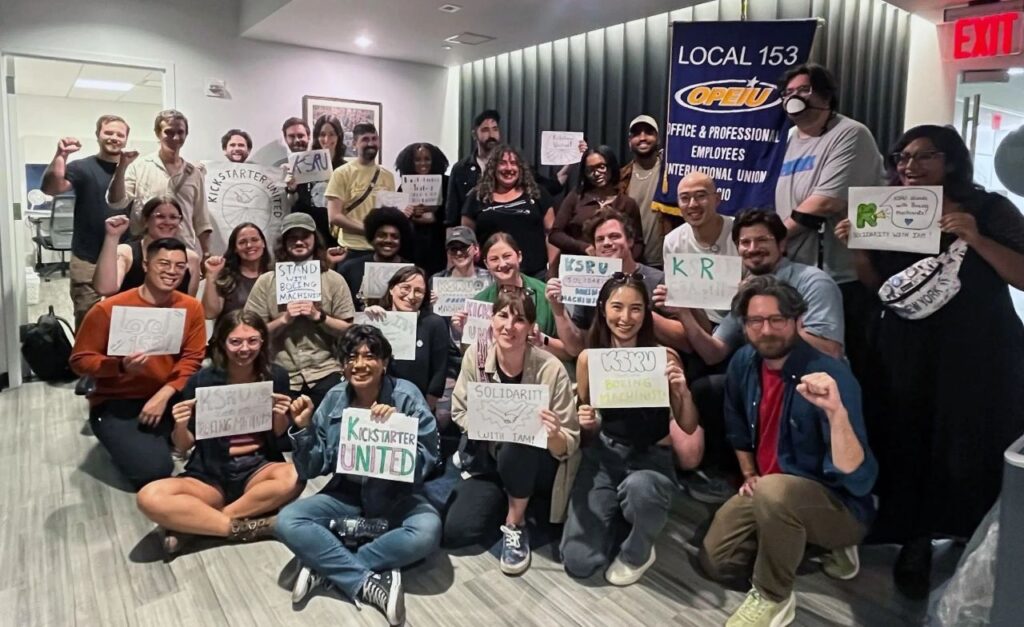Kickstarter, an online crowdfunding platform that has launched thousands of creative projects, is now the epicenter of a fierce workers and management dispute that could alter its trajectory. In a dramatic escalation of labor unrest, Kickstarter United, the union representing its workforce, has initiated a strike, disrupting operations and exposing what they describe as a “betrayal of Kickstarter’s progressive values.”
Based on the latest information, 85 percent of Kickstarter United (OPEIU Local 153) members voted to authorize a strike unless management reaches a fair contract agreement. This represents the full membership of the unionized workforce, which includes roles like software engineers, community support specialists, trust and safety analysts, and marketing professionals across offices in New York and Seattle.
The strike, which began on October 2, 2025, disrupting Kickstarter’s operations, stems from two core demands. First, workers want to codify the 32-hour, four-day workweek that has defined their workplace for over three and a half years. “We’ve been happier, more efficient, and shipped some of the platform’s biggest features on this schedule,” union representative Jeremy Gottfried tells me.
“Kickstarter’s executives have sung praises about the 4-day workweek publicly for years. Yet, in bargaining for their second union contract (the first won in 2022), management has rejected entrenching this practice,” Gottfried claims. “Frankly, we’ve been disappointed and surprised by Kickstarter management’s outright rejection of these very reasonable demands,” he asserts.
The second reason sparking the protest is the management’s negligence in the union’s demand for a pay increase for the lowest-paid employees. Earlier reported by The Verge, the union is pushing for a minimum salary that ensures a living wage for mission-critical roles, such as Trust and Safety analysts, Community Support specialists, and Outreach team members.
“These workers, essential to keeping creators supported, often live paycheck to paycheck,” an outreach manager at Kickstarter, who requested to remain anonymous, tells me. “Management claims current pay is generous enough, but that’s hard to square when some colleagues can barely make ends meet,” the person claims. The union’s frustration peaks at what they see as hypocrisy from a Public Benefit Corporation (PBC) that touts equity and inclusivity. “We’re disappointed and surprised,” the union added, noting that management’s refusal to budge “puts our creators at risk” by forcing the strike.
The spark for this standoff came in March 2025, just as contract talks began. Knowing the four-day workweek was the union’s top priority, management abruptly shifted most employees to a five-day schedule without extra pay. The stated business reasons for the shift to five days were “current economic instability” and “competitive pressures” in the crowdfunding industry.
Also Read: The Vicious Truth of Crowdfunding is Clouded by Scams, Frauds, and Ghosting
“We came to Kickstarter because we believed in its mission and its promise to care for workers,” another union rep emphasized. The union’s terms to end the strike are straightforward: codify the four-day workweek with flexibility for temporary adjustments and ensure a living wage for all. “Management can end this by bargaining in good faith,” the union stressed. On September 5th, the employees held a public virtual rally to support their fight for a fair contract. The online protest featured unionized tech workers who’ve gone on strike, elected representatives who support a 32-hour work week, and Kickstarter United members. The protest has received some staunch support from Kshama Sawant, a former City Council member, Seattle and current candidate for the United States Congress, advocating a 30-hour work week and a $25 per hour minimum wage.
The strike’s impact is evident across Kickstarter’s ecosystem. Creators, reliant on timely support for campaigns, face delays in resolving urgent issues, bug fixes, and new features. Owen O Brian, who has just launched his campaign on Kickstarter, claims, “I am encountering difficulties on the dashboard, with delayed communication from Kickstarter support making matters worse.” Backers, too, are encountering hiccups, threatening the trust that powers crowdfunding.
Yet the union is adamant about its demands. “We’re not asking for a boycott,” the union asserts. “We know creators rely on their Kickstarter campaign funds and often have tight schedules to keep for their business. But let’s be clear, management could have prevented this strike by bargaining in good faith, and it’s still in their power to end it.” The union is placing the blame squarely on management’s refusal to negotiate, which has forced workers to halt operations to make their voices heard.
The union’s protest has also received some outside support. Nearly 4,000 letters have flooded management through a union-led campaign, demanding action. A petition to CEO Everette Taylor has surpassed 1,000 signatures, with creators and backers amplifying the call online. Fellow unions like the NYT Tech Guild and Alphabet Workers Union, along with elected officials, have voiced support. “This outpouring inspires us,” the union said, urging more public pressure to push management to the table.
Reddit, though fairly divided on the matter, has come to the protesters’ support, highlighting, “Companies don’t have a right to your time. That’s the whole point of protest and unions. Without unions, some would still be working 10-16-hour days, 6 days a week.” Another redditor commented, “If the company lied, then to hell with Kickstarter, but if they didn’t, this sounds a little entitled.” I tried reaching out to the management for their side of the story, but I haven’t heard a word yet.
As Kickstarter United’s picket lines hold firm, the strike is more than a labor dispute. It’s a test of whether Kickstarter can live up to its progressive ideals. For Jeremy Gottfried and his colleagues, it’s about preserving a workplace that empowers both workers and creators. “Management can end this today,” he said. “Honor the four-day work week, pay a fair wage, and let us get back to building the platform our community loves.” Will Kickstarter’s executives listen, or will their hardline stance tarnish a platform built on collective dreams? For now, the workers’ fight continues, and the crowdfunding world is watching.

